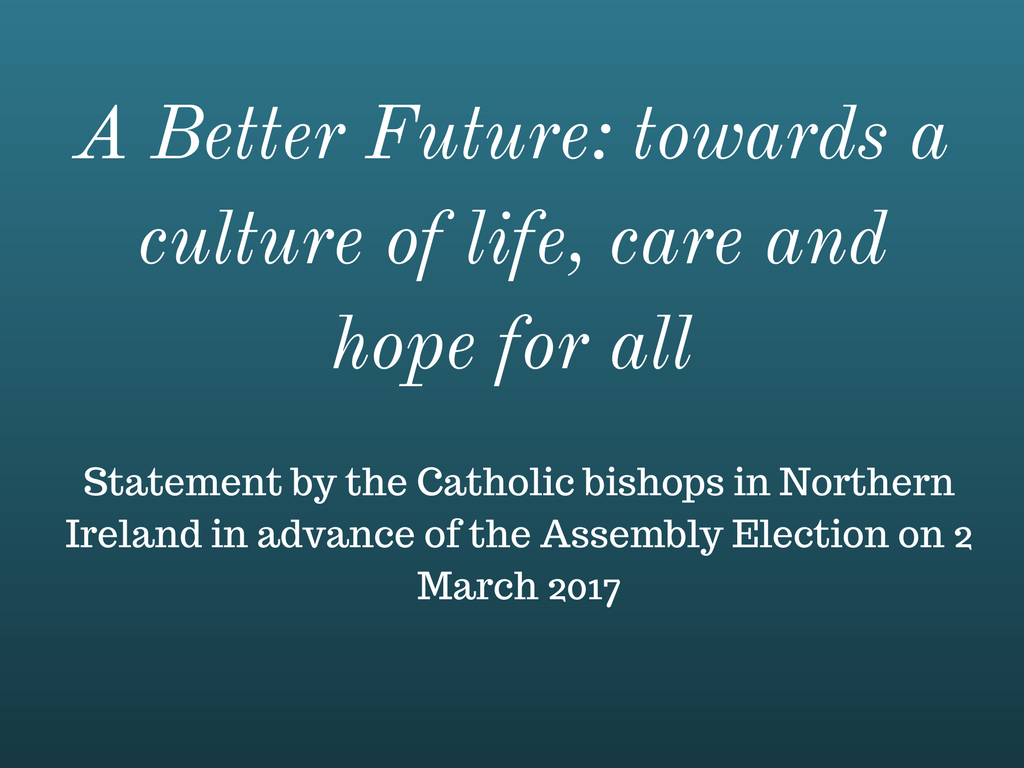The Catholic Bishops in Northern Ireland have published a statement and pastoral reflection in advance of the Assembly Election on Thursday 2 March. The statement addresses political leaders and all people of good will.
The statement and pastoral reflection are issued in the names of: Archbishop Eamon Martin, Archbishop of Armagh and Primate of All Ireland; Bishop John McAreavey, Bishop of Dromore; Bishop Noel Treanor, Bishop of Down & Connor; Bishop Donal McKeown, Bishop of Derry; and Monsignor Joseph McGuinness, Diocesan Administrator of the Diocese of Clogher.
Addressing political leaders the bishops said, “The premature collapse of our political institutions is a serious matter for all of us. We depend on you, our politicians to help shape a healthy, positive and peaceful society in which there are ample, quality jobs, decent housing, comprehensive healthcare, and first-class education for all.
“We thank you for your public service, the sacrifices and commitment that you have made for the good of our society. However at this time, with growing divisions in our political life locally and the negotiation of change in our status in the European Union, we ask that you reject the temptation to retreat into partisanship.
“Many of you and your predecessors have helped to create a more peaceful and more prosperous society here over the past twenty years. And yet, sadly, the bitter language and tone of conflict have to some extent returned to the political discourse. We ask you to reject – and to leave behind – divisive language and actions which will make negotiations more difficult after the election.”
The bishops went on to say, “We depend on good governance to help us, our families and the wider community to live good and constructive lives. A dole queue, an over-full hospital ward, a leaking school roof or poor infrastructure affects everyone. We depend to a great extent on you, our political leaders to lead, to govern, to compromise and ultimately, to agree, for the good of all in our society.
“We ask you to recommit to working for the common good, especially for the vulnerable, the disadvantaged and all who struggle daily to bring up their families. Like many in the community, the Churches are available to assist you in any way. We will certainly pray for you in the coming weeks.”
Addressing all people of goodwill the bishops said, “We urge all voters to take seriously the responsibility of voting in the forthcoming Assembly Election. As Catholics we have a duty to be hopeful and, despite the challenges, to work towards creating a society that values all of its people.
“Pope Francis reminds us that engaging with the democratic process is primarily about participation in a process that can lead to a more just society:
None of us can say, ‘I have nothing to do with this, they govern…’ No, I am responsible for their governance, and I have to do the best so that they govern well, and I have to do my best by participating in politics according to my ability. Politics, according to the Social Doctrine of the Church, is one of the highest forms of charity, because it serves the common good. I cannot wash my hands (Pope Francis on Vatican Radio, September 2013).
“With this in mind, we ask all people of goodwill to consider the policies of candidates, assess the spirit and detail of their manifestos and then evaluate them in light of this question: How effectively does a particular candidate’s policies strengthen and support the full human dignity of all members of our society?
“In our role as pastors, we have updated our reflection A Better Future: Towards a Culture of Life, Care and Hope for All of April 2016. We draw attention to key questions which voters may wish to raise with candidates regarding: the protection of human life and dignity at all stages, marriage and the family, child poverty, matters pertaining to education, and issues concerning migrants and refugees.
“Our intention in publishing this statement is to assist the faithful in considering key issues that they face at this critical time for our society.”
The bishops also published ten questions based on Catholic Social Teaching to ask candidates standing in the Assembly elections:
- What will you do to address the unacceptable levels of childhood poverty in Northern Ireland and the widening gap between rich and poor?
- What will you do to uphold the right to life of unborn children and adults with severe life-limiting disabilities, as well as children conceived through sexual crime, if the next Assembly seeks to introduce legislation that removes the fundamental right to life from them?
- Do you support abortion, the direct and intentional taking of an innocent human life in any circumstances?
- What will you do to protect and support family and marriage and in particular the natural institution of marriage between one man and one woman as the fundamental building block of society?
- Will you support the right of religious organisations to provide services in a manner consistent with their religious ethos and beliefs?
- Will you support the right of parents to have Catholic schools as part of a diverse system of educational provision, based on parental choice?
- What will you do to highlight the persecution of Christians and other persecuted groups across the world?
- What will you do to address human trafficking in Northern Ireland and to help improve services for refugees, asylum seekers and the homeless?
- What will you do to help achieve those UN Sustainable Development goals that are ethically consistent and ensure proper care and respect for the natural environment?
- What will you do to create a more constructive and inclusive political culture in the next Assembly, one that gives hope to all in our society for a better future?
For more see www.catholicbishops.ie.
ENDS


